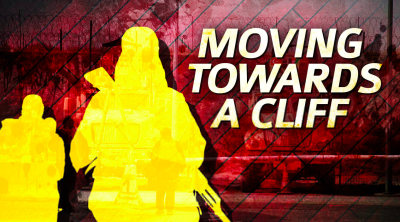Video: War on Syria: Greater Idlib Moving Towards a Cliff after Failed Putin Erdogan Meeting

All Global Research articles can be read in 51 languages by activating the “Translate Website” drop down menu on the top banner of our home page (Desktop version).
Visit and follow us on Instagram at @crg_globalresearch.
***
Russian President Vladimir Putin and Turkish President Recep Tayyip Erdogan concluded their “historic meeting” in Moscow.
The two discussed Greater Idlib and reached agreement on absolutely nothing of substance. As a result, the situation is as volatile as ever.
Militants will continue shelling both the Syrian Arab Army (SAA), as well as civilians, while the Russia’s Aerospace Forces (VKS) will continue their airstrikes on Hay’at Tahrir al-Sham (HTS) and co.
During the summit, President Erdogan praised the joint work with Russia on Syria after stressing that Turkish-Russian relations are vital for any peace process in the Middle East.
Both presidents repeatedly called each other friends, while agreeing on nothing conclusive. Many observers expected that the summit will see the birth of a new Russian-Turkish agreement to resolve the issue of Greater Idlib. However, it ended without any announcement or even a press conference.
As a result, either a hidden agreement was made that the public wasn’t notified, or the status quo will be kept.
Still, likely as a sign of good will, VKS warplanes didn’t carry out airstrikes on Greater Idlib over the day, but if no actual solution was agreed on the raids are likely to continue.
The situation in the Syrian region is slowly spinning out of control. A Russian-Turkish ceasefire agreement reached last year is barely holding up.
Russia has stepped up its airstrikes on terrorists in the region in the last two months. A large-scale ground operation by the SAA and Russia has been expected for nearly a week. In 2020, the ceasefire agreement was signed precisely to avoid such a significant ground offensive.
To prepare for the potential operation, Turkey deployed more troops in the region, including new artillery and other hardware.
These troops are necessary, because despite most of the militant factions in northeastern and northwestern Syria being backed by Turkey, infighting amongst them is not that uncommon.
On September 28, clashes broke out between two units of the Mu’tasim Division in the Turkish-occupied town of Ras al-Ain in northeastern Syria.
A disagreement over checkpoints located on profitable smuggling routes and the distribution of houses forcibly taken from locals were reportedly the main cause of the clashes, which took place in the central and eastern parts of Ras al-Ain.
The following days will reveal whether best friends Putin and Erdogan agreed on anything to avoid further fighting in Greater Idlib. It is yet to be seen if ceasefire violations by the militants continue and what the SAA and VKS response will be.
*
Note to readers: Please click the share buttons above or below. Follow us on Instagram, @crg_globalresearch. Forward this article to your email lists. Crosspost on your blog site, internet forums. etc.
SUPPORT SOUTHFRONT:
PayPal: [email protected], http://southfront.org/donate/ or via: https://www.patreon.com/southfront

